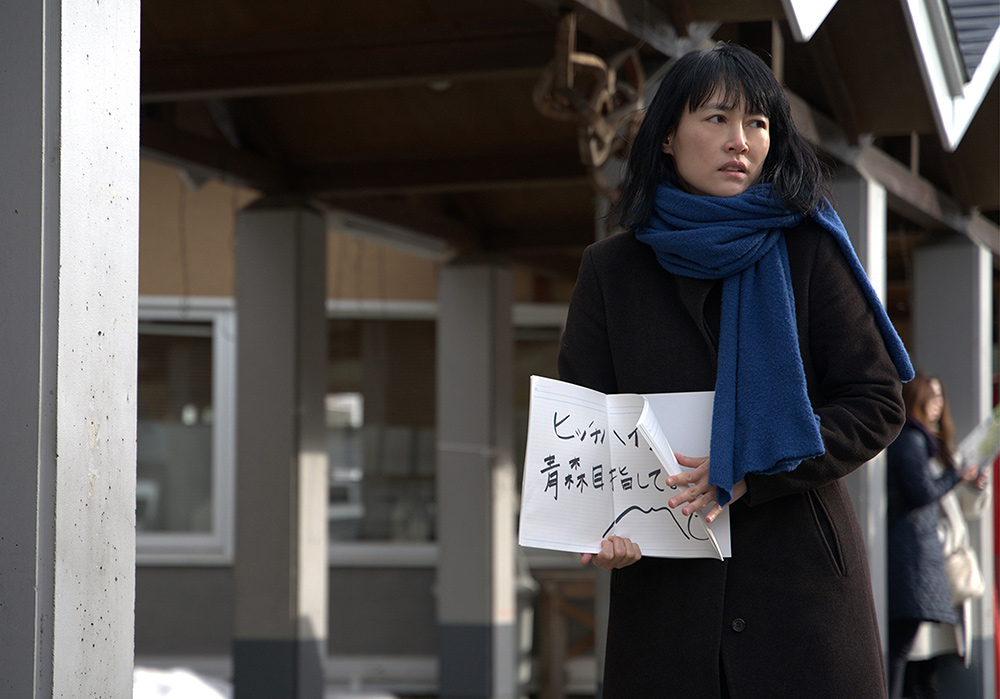!["658km, Yoko's Journey" Director Kazuyoshi Kumakiri A life that could have been for me [Director's Interview Vol.336]](https://cinemore.jp/images/c25b4e29dede77aa47451f1e01df6142a44b37e12ce6cb7859b5a1dbe57e82b3.jpg)
"658km, Yoko's Journey" Director Kazuyoshi Kumakiri A life that could have been for me [Director's Interview Vol.336]
The scenery of Tohoku projected on the screen. The coldness and melancholy that gradually become visible as you move north. Regret oozes out from Rinko Kikuchi, also known as Yoko, who moves forward in this situation. Everything comes together harmoniously and approaches my heart. Why do I have such feelings for Yoko, who has never been able to become anything? After watching a movie, I naturally find myself ruminating. ``658km, Yoko's Journey'' may be one of the few movies in Japan these days that satisfy the ``cinema experience''.
How did director Kazuyoshi Kumakiri create this masterpiece? We spoke to him.
Synopsis of "658km, Yoko's Journey"
42 years old, single, from Hirosaki City, Aomori Prefecture. Yoko (Kikuchi Rinko), a part-time worker from the employment ice age generation who has given up on life and is living a carefree life, receives news that her father, who was once opposed to her dream and had been cut off from her for more than 20 years, has suddenly died. She reluctantly heads to Hirosaki by car with her cousin Shigeru (Takehara Pistol) and his family, but is left behind by the Shigeru family, who are distracted by a child causing trouble at a service area on the way. Yoko hesitates to go to Hirosaki, but since she has no money, she decides to hitchhike. However, the funeral procession is tomorrow at noon. Yoko's stagnant heart is shaken by the people she meets on her overnight trip north - a sharp-tongued single mother (Kurosawa Asuka), a friendly girl (Mikami Ai), a suspicious writer (Hamano Kenta), a warm-hearted couple (Yoshizawa Takeshi, Kazebuki Jun), and the vision of her father in his younger days (Odagiri Joe) who appears as if to stand in her way. With the cold early winter winds of Tohoku howling, will Yoko be able to reach her parents' home in time for the funeral procession?
This time, a video version of the interview is also released! Please enjoy it as well!
Index
- The life I could have had
- Working with Rinko Kikuchi for the first time in 20 years
- Casting the people you meet
- I would have taken the photos even if it wasn't snowing.
- We shot 7 takes, and the first one was used.
The life I could have had
Q: It turned out to be a wonderful piece of work. How do you feel about it?
Kumakiri: Well, there was (laughs). There was a period when we couldn't film due to COVID, so this was the first film we shot in a long time. It was a very simple film, and we were able to shoot each shot carefully. Kikuchi's acting was truly overwhelming, and I was really moved while filming. It was a set where not only I, but all the staff felt that we were making something good.
Q: How did the request come to Director Kumakiri this time?
Kumakiri: I was approached by Hiroko Matsuda, a producer at Office Shirouzu, with whom I have worked on many films together. The film has a slightly clumsy female protagonist similar to the heroine in my previous film, " Nonko, 36 (Housewife) " (2008), and she asked if I would be interested. She said she would do a road movie, even though it was a film with no budget. Road movies are quite difficult (without a budget), but if I could revise the script so that it could be made into a reality, I told her I would like to do it.
Q: What did you think when you read the script?
Kumakiri: The main character was over 40, a socially awkward woman with a lot of regrets, so I somehow wanted to root for her. I wanted to write a heroine like that. I'm from Hokkaido, so I was also really drawn to the idea of heading north.

"658km, Yoko's Journey" ©2022 "658km, Yoko's Journey" Production Committee
Q: Were there any parts of the script that had to be adjusted for filming?
Kumakiri: This time, I used the pen name Namiko Sou and rewrote the script with my wife. I liked the image of the heroine, but I didn't want to make her too sentimental. She has big things on her mind, but if she takes it too far, she'll become like a tragic heroine. I wanted to make her a bit more dry, with a certain brazenness and a hint of humor, so I made a big change there. I also made small changes to the other characters that appear.
Q: The heroine is from the generation that experienced the employment ice age, close to the director's generation. The director himself said, "If I had made one wrong move, I might have ended up like this," but was there anything you could relate to?
Kumakiri: Although it's a movie about a heroine, I thought it was a life that could have been my own, regardless of gender. My father is a plumber, and although he's very supportive now, when I left my hometown at the time he told me, "Water is necessary for humans, but movies are not necessary" (laughs). When I think back to that, I think it would have been entirely possible for me to have had a life where I hadn't accomplished anything. I really sympathized with that part.
Q: Yoko's line, "It's too late now..." was very memorable. Did you put your own feelings into that line?
Kumakiri: The original script by Muroi also had a scene where he poured out his feelings. We changed it a little, but my wife and I think it was closer to how we felt.

